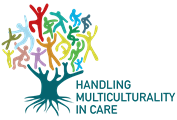Project summary
Scientific background
Innovative aspects
Process of MultiCult
Results
Project impacts
Results
We have reached the following results in our project:
1. More experience in collaboration between education and employment:
Everything that was developed in this project took place in close cooperation in each country between care institutions and schools/colleges/training institutions. At the transnational partner meetings, experiences were shared among the involved countries. This was not always easy as work and education represent two different cultures and values but it was worth it because the result was training courses that are relevant and usable and thus have a big impact.
2. New teaching methods to support improvements in formal and informal vocational education are developed with employees as co-developers:
We took it very seriously that the participants should be co-developers of their own training, This was a new thing to the caregivers (and also to some of the trainers) and in the beginning some of them were reluctant to take this responsibility. However, gradually the participants changed their attitude and ended up with a strong feeling of ownership. For the teachers it was useful to experience that you need not control everything but should let go and let the experiences of the participants influence on contents and methodology. For the educational institutions that took part in the project, the developed methods and material already serve as new tools to be used, and in general, the project approach has given inspiration within the formal training systems. This is also the case for the informal education of caregivers that is provided by leaders of the care institutions when needed.
3.Caregivers have learned new methods to support their future opportunities for further training in acquisition of new key competences:
Employees perceive that they have been presented with new methods that opened their readiness to learn in the future. Some of the employees were somewhat threatened by the new methods in the training such as videotaping, co-developing, self-reflecting and the European dimension of the project. Moreover, in some cases it took the trainers some effort and experience to help the trainees to face this thread and take a try. Once that step was taken, we saw that the trainees had new ideas about themselves and about learning in their organization. They really took personal experiences and a new view on their own values back into their teams. It should also be mentioned that the training in general contributed to the improvement of the ICT competences of the participants as new technology such as use of laptops and iPads were integrated in the training and offered to them the opportunity of finding information and videotaping situations and role games.
4. Caregivers have achieved new key competences regarding their understanding of different value systems and cultural backgrounds:
The caregivers, who took part in the trainings in the four involved countries, achieved new relevant competencies and the feedback from participants and stakeholders convinced us that the project was a very important step in giving more priority to the topic of multiculturality in the care sector. The caregivers learned a lot, from different aspects, about themselves and their colleagues with different cultural background. The project partners representing working life, report that they have observed their staff using the new competences in their work. Their ability to be aware of, identify, reflect on, handle and benefit from differences of culture and values has been improved.
5. A strengthened development within the care sector that rely on a broad European basis in relation to differences in culture, organizational, economic and technological framework.
Caregivers who have become more competent means a strengthening of the care sector. Those staff members, who took part in the training, got a new perspective on how cultural differences influence themselves, their lives and their everyday work. We believe that they did experience that they can deal with cultural differences better and that they are more ready and open to their foreign staff members. In general, the training has made them better at dealing with – and benefiting from - cultural differences and has created a greater readiness in relation to changes in the cultural maps on their job.
6. Development within the care sector's vocational training is facilitated through the transfer of knowledge and experience from other sectors.
The starting point of the whole project was actually the idea to transfer knowledge and experience from the research of Mr. Bouchet that was carried out in the business sector so this project is an example of transfer of innovation from one sector to another: From private business to the care sector. For the future transfer, our dissemination activities has resulted in establishing contact to other sectors as well: education, the voluntary and community sectors and local authorities.

